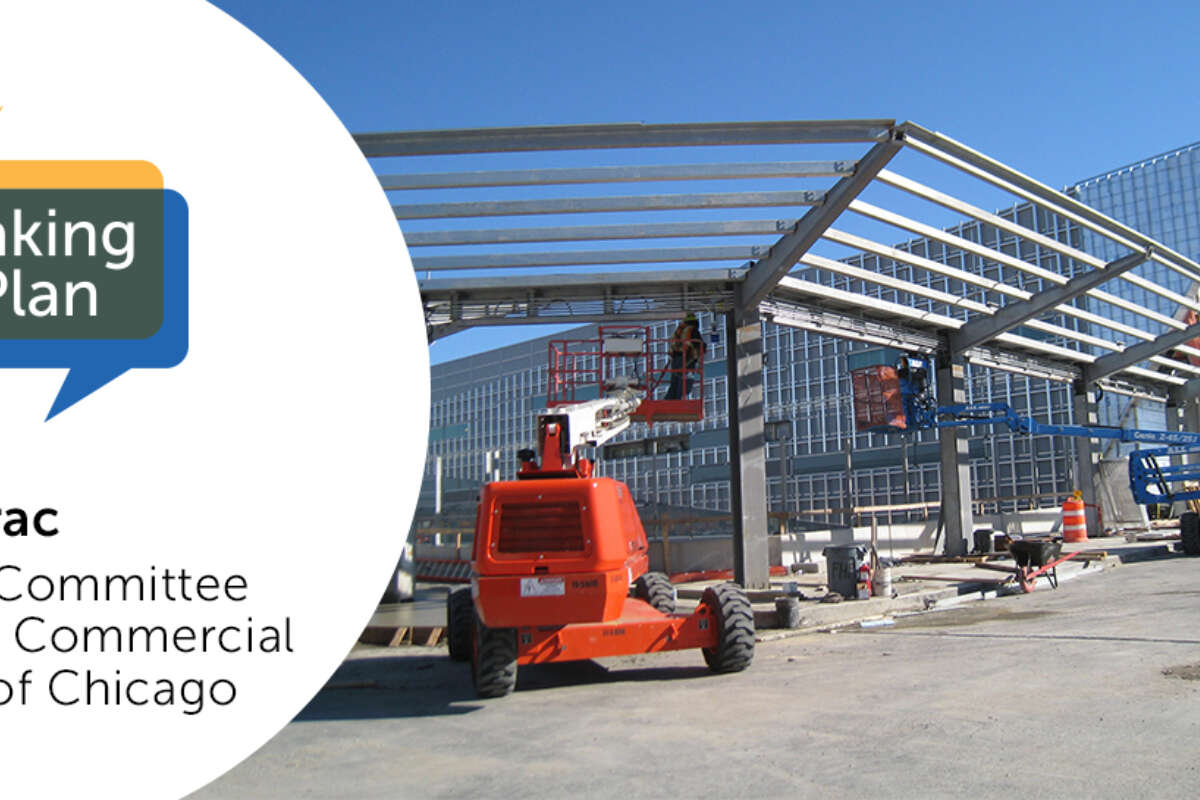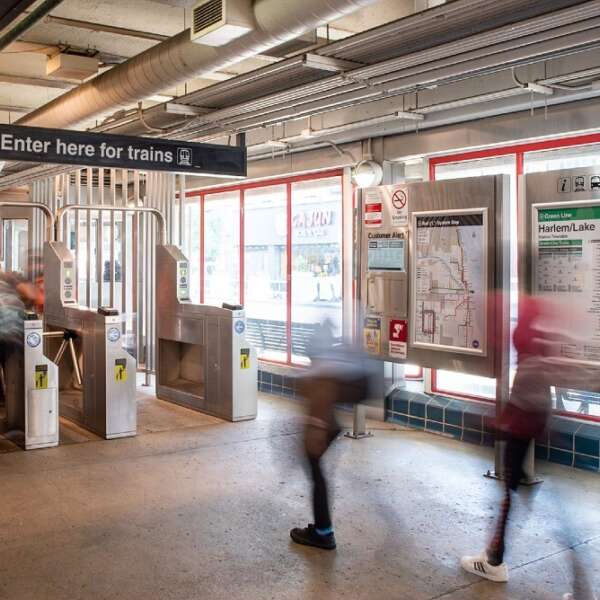Guest blogger Tom Kotarac says now is the time to rethink the transit status quo
October 12, 2021
October 12, 2021

 The RTA is currently developing the 2023 Regional Transit Strategic Plan for Northeastern Illinois at a time when the challenges and opportunities facing our region’s transit system have never been greater. Making a Plan represents our effort to engage and collaborate with close stakeholders and the public. We have invited a group of transit users and thinkers to answer a set of questions for an occasional guest series on Connections, the RTA blog. The views represented in this series are not those of the RTA, but they are views we want to hear and have heard. If you have thoughts about this post, the strategic plan, or would like to participate by contributing a guest blog post, please email communications@rtchicago.org and subscribe to our newsletter to learn more.
The RTA is currently developing the 2023 Regional Transit Strategic Plan for Northeastern Illinois at a time when the challenges and opportunities facing our region’s transit system have never been greater. Making a Plan represents our effort to engage and collaborate with close stakeholders and the public. We have invited a group of transit users and thinkers to answer a set of questions for an occasional guest series on Connections, the RTA blog. The views represented in this series are not those of the RTA, but they are views we want to hear and have heard. If you have thoughts about this post, the strategic plan, or would like to participate by contributing a guest blog post, please email communications@rtchicago.org and subscribe to our newsletter to learn more.
Name: Tom Kotarac
Organization or Affiliation: Civic Committee of the Commercial Club of Chicago
Role/Responsibilities: Senior Vice President Transportation & Infrastructure
Favorite transit mode or station? I’m from Bridgeport and the Sox 35th Red Line station is the one I used the most growing up and, of course, the White Sox are the greatest team in Chicago.
Why are you passionate about transit?
I have a real personal connection to transit. My grandfather came here from Croatia in the early 1900s and spent his life working on the CTA and its predecessor, the Chicago Surface Lines as a general laborer. He lost an eye while working on the track and kept on working until retirement, supporting six kids as a single parent in a tiny Bridgeport apartment on a transit salary. My dad was a clerk for different railroads his whole career. Transportation is in our family DNA and I guess I have the transportation policy geek gene.
What do you see as the greatest challenges and opportunities for the Chicago region’s transit system over the next ten years? What is the biggest barrier to realizing these opportunities?
Climate change, equity, and economic development. The resilience of the system to climate shocks, extreme weather, and floods, is something transit systems across the globe are grappling with and ours is going to have to as well. We need to plan, invest, and operate our transit system with these issues in mind.
On equity, the pandemic emphasized transit’s role as a lifeline. It’s important to think about the access to opportunity that transit can provide to low-income workers and people of color. We really don’t measure access very well and we need to give our transit agencies new tools to drive investments to projects that improve access to jobs, healthcare, and education.
On economic development the challenge is how does the transit system provide a competitive way to move around, not just to work but other trips.
The barriers to all of these are about breaking the status quo. Now more than ever we need to reevaluate our past practices in transit, our operating models, our funding of transit, the way we distribute the funding that comes in.
Tell us your ideas for improving access to transit within the Chicago region and what policy levers or partnerships might be required to make the changes you envision?
It’s all about coordination and integration of the transit Service Boards with each other. That could mean syncing schedules among Metra, Pace, and CTA. The Fair Transit South Cook pilot is a great example.
There are other sites in the region that are close to Metra lines that could run under a different model to increase access and grow economic opportunity. Why not try a pilot supercharged with Metra service to O’Hare International Airport, from downtown to the West Loop/Fulton Market to the airport in less than 30 minutes?
Figuring out how to operate the commuter rail system differently with better coordination is important and key to that is fare integration. Without fare integration we don’t have the ability to innovate and attract new riders by providing different types of fare packages.
Better integration between our three transit systems can happen today. It starts with having leadership and political will to get these things done. It is the RTA’s role as a regional body to bring those parties together and implement it.
Decades of underfunding have left the transit system in a constant state of austerity. Tradeoffs are almost always necessary when making decisions about improvement and expansion of the system. How do you recommend investing in the system to achieve the greatest regional impact?
We need to change the siloed method of funding for state transportation that separates money for roads versus transit. Issues like climate change, equity, and economic development are not just road problems or transit problems.
There is a new law that requires RTA and the Illinois Department of Transportation to use performance-based programming, or transparent, data-driven allocation in project selection. The RTA should evaluate projects against each other transparently to find out where the benefits are the greatest.
The way we spend mass transit dollars need to move beyond state of good repair and spending money quickly. When you limit yourself to just those two policy issues like the current RTA process does you are missing conversations about tradeoffs that are important when making capital investments in the billions of dollars.
Meaningful progress on this would mean having the RTA evaluate large projects against a set of more comprehensive criteria and use the results to decide which capital investments will have the biggest impact on our region and the future of the system.
The role of transit as the irreplaceable piece of our mobility system has been underscored by this pandemic. Data and survey results have shown how much essential workers, low-income riders, and residents of color have relied on it over the past year and a half especially. How has the pandemic changed or clarified your views on the role and future of public transit?
Transit’s critical role was emphasized during the pandemic and people have a new appreciation for it. We need to respond to what we learned by prioritizing the projects and operations that will bring the greatest benefits to communities that need it the most.
When evaluating projects, there needs to be a better way to measure equity of our transit investments and we are not there yet. We need to evaluate and make these decisions with data so we can understand the tradeoffs and benefits of different investments before we make them.
The RTA did a great job in the way it recently distributed federal relief fund dollars: they reviewed and replicated the best practices of peer agencies, used new and updated data to better understand the use of the transit system, and had a strong outreach program to educate transit users and the public about how they were spending funding. This funding process is a great model to build from and use to drive other investments.
Regional mobility impacts everyone but is competing for attention among many worthy public policy issues. What in your experience has been the most successful way to engage people about transit issues?
Don’t forget employers, they are on the front lines of understanding what the future of work will be and what our transit system will need to meet those emerging and changing needs. I’m also a big fan of real-time feedback and incorporating the lived experience of people using the transit system into our processes. Lastly, ask the transit workers, they love the system, and many have dedicated their lives to it much like my grandfather did many years ago. When you ask people who are on the system every day you get the best insights, and we should listen and learn from them.
Subscribe to our Newsletter
Related Articles
 Why fully funding paratransit service and reduced fare programs is key to closing the transit budget gap
Why fully funding paratransit service and reduced fare programs is key to closing the transit budget gap
With transit facing a fiscal cliff in 2026, fully funding critical programs like ADA paratransit service and free and reduced fare programs is one key to clo...
February 18, 2025 New stations on CTA Green Line, Metra UP-N line increase transit access for residents, riders
New stations on CTA Green Line, Metra UP-N line increase transit access for residents, riders
In 2024, CTA and Metra opened two new stations: the Damen station in Chicago’s Near West Side neighborhood along CTA’s Green Line and the Peterson/Ridge stat...
January 28, 2025 2025 Regional transit budget available for public comment, foreshadows risk to system’s future without fiscal cliff solution
2025 Regional transit budget available for public comment, foreshadows risk to system’s future without fiscal cliff solution
The RTA has released the 2025 Regional Transit Operating Budget and Five-Year Capital Program for download and public comment. The budget comes as an operati...
November 15, 2024 With equity at the forefront, CTA, Metra, and Pace open new facilities, prioritize upgrades in south and west communities
With equity at the forefront, CTA, Metra, and Pace open new facilities, prioritize upgrades in south and west communities
This year, CTA and Pace have opened or advanced various new facilities in south and west communities throughout the region, and Metra has prioritized upgrade...
October 9, 2024 New project management oversight report highlights more than 100 projects representing $8.2 billion in capital investments
New project management oversight report highlights more than 100 projects representing $8.2 billion in capital investments
The RTA’s Project Management Oversight (PMO) program ensures that the Service Boards—CTA, Metra, and Pace—are spending capital funds and managing their infra...
June 27, 2024 Transportation Tuesday recap: Improving and expanding the transit system strategically
Transportation Tuesday recap: Improving and expanding the transit system strategically
With last year’s adoption of Transit is the Answer came 15 new evaluation metrics that comprise a strategy for evaluating and selecting capital projects. Now...
May 30, 2024